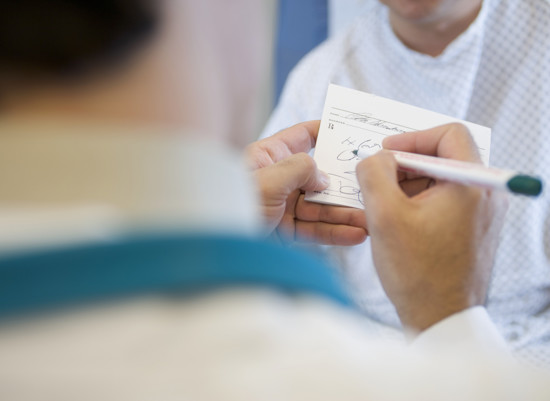Some tests and procedures can take time, so if you’ve scheduled any tests before your appointment, make sure to arrive early.
Sometimes, you may need to prepare before the appointment. This could mean:
- not eating or drinking
- skipping certain medications
- bringing a morning urine sample
If you’re unsure, contact your GP’s office for advice ahead of time.
Many GPs offer appointments via text or video in addition to in-person visits. Not all medical concerns can be addressed digitally. If you’re unsure which type of appointment is best for you, reach out to your doctor’s office for guidance.
Decide in advance what you want to discuss
Patients may have multiple health concerns they want to address. Writing down your main concerns on a list can help. Start with what you feel is most important. This helps the GP assess if the issues are related and allows them to manage the time effectively. It also helps them determine if additional appointments are necessary.
Be open with your GP
You can be open and honest without worrying about your information being shared. Your GP and the entire medical staff are bound by confidentiality rules. The more information you provide, the better they can assist you.

Duty of confidentiality
Health personnel are not permitted to disclose medical information about you to others without your consent, unless they can do so by law.
Illustration: Johnér Bildbyrå AB
It’s okay to get a second opinion
You have the right to switch GPs or seek a second opinion if needed. The GP scheme is designed to help you build a trusting relationship with your GP over time.
Inform your doctor about medication, hospital visits, or emergency room visits
Let your GP know if other doctors have changed your medications. Your primary care GP doesn’t automatically receive updates from the emergency room, hospitals, specialists, or clinical psychologists.
Tell your GP about any non-prescription medications you’ve taken, such as paracetamol or ibuprofen. If you use herbal remedies, your GP should know about these too.
You can choose where to receive treatment
If your GP refers you for further tests or treatment, you have the right to choose where this happens. You can check waiting times on the Choose your treatment centre.
Together, you and your GP can find the best place for your treatment. Your GP can send your referral directly to the preferred location. However, this choice doesn’t apply in emergency situations.

View your medicines online
Once you have received an e-prescription from your GP, you can log in to Helsenorge to view a summary of your prescriptions and medicines.
Illustration: Johnér Bildbyrå AB
Using an interpreter
You have the right to receive information about your health and treatment in a language you understand. If you need an interpreter, inform the GP´s office in advance. For urgent appointments, a phone interpreter can be used.
Travel cost coverage for doctor’s appointments
You may be eligible for reimbursement of travel costs to your local GP if you are too sick to travel on your own. Generally, the cheapest form of public transportation will be covered to and from the nearest treatment center.
For more information on assisted transportation, contact the patient travel office at 05515.
Patient travel
If you are travelling to or from public healthcare treatment, you may have the right to have your travel costs refunded.
Payment at the GP’s office
Many GP’s offices have payment machines and prefer card payments. GPs cannot charge fees for card payments or sms appointment bookings. You can also request a bill.
Delays at GP’s office
Sometimes, delays occur if a patient with a serious condition needs to be prioritized, which can affect the schedule. However, it’s important that you arrive on time. If you’re running late, let the office know as soon as possible. In some cases, a new appointment may need to be scheduled.
To keep wait times down, cancel appointments you no longer need as early as possible. Appointments must be canceled at least 24 hours in advance to avoid being charged.